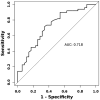Association between triglyceride-glucose index and the risk of stroke among moyamoya patients: a single-center retrospective study
- PMID: 40162010
- PMCID: PMC11949810
- DOI: 10.3389/fneur.2025.1547627
Association between triglyceride-glucose index and the risk of stroke among moyamoya patients: a single-center retrospective study
Abstract
Background: Moyamoya disease increases the risk of strokes by impairing cerebral circulation, significantly affecting patients' quality of life. Despite the profound implications of this condition, there is a limited body of research exploring the factors that contribute to strokes in patients with Moyamoya disease. This study aims to evaluate the predictive value of the triglyceride-glucose index (TyG index) in forecasting stroke events among individuals diagnosed with moyamoya disease.
Methods: A total of 84 patients diagnosed with Moyamoya disease were treated at Changshu First People's Hospital from 01 January 2019 to 31 October 2024 were included in this study. We systematically collected and analyzed their clinical histories, laboratory test results, and baseline data. The patients were classified into two groups based on their history of cerebral stroke. Subsequently, we conducted a comparison and analysis of the TyG index between these two groups.
Results: The TyG index observed in patients with moyamoya disease who have a history of cerebral stroke was significantly elevated compared to that of patients without such a history. This difference was found to be statistically significant (p < 0.05). Furthermore, regression cubic splines analysis indicated a noteworthy linear relationship between the TyG index and the occurrence of cerebral stroke events.
Conclusion: In individuals diagnosed with Moyamoya disease, the TyG index has been shown to have a significant correlation with the risk of cerebral stroke. Furthermore, it has the potential to serve as an effective predictor for the occurrence of stroke.
Keywords: Moyamoya disease; atherosclerosis of the arteries; insulin resistance; stroke; triglyceride-glucose index.
Copyright © 2025 Zhang, Guo, Xu, Kong and Liu.
Conflict of interest statement
The authors declare that the research was conducted in the absence of any commercial or financial relationships that could be construed as a potential conflict of interest.
Figures
Similar articles
-
Long-term survival in stroke patients: insights into triglyceride-glucose body mass index from ICU data.Cardiovasc Diabetol. 2024 Apr 25;23(1):137. doi: 10.1186/s12933-024-02231-0. Cardiovasc Diabetol. 2024. PMID: 38664780 Free PMC article.
-
Exploring the prognostic impact of triglyceride-glucose index in critically ill patients with first-ever stroke: insights from traditional methods and machine learning-based mortality prediction.Cardiovasc Diabetol. 2024 Dec 18;23(1):443. doi: 10.1186/s12933-024-02538-y. Cardiovasc Diabetol. 2024. PMID: 39695656 Free PMC article.
-
Correlation between triglyceride-glucose index and early neurological deterioration in patients with acute mild ischemic stroke.Front Neurol. 2024 Nov 28;15:1441116. doi: 10.3389/fneur.2024.1441116. eCollection 2024. Front Neurol. 2024. PMID: 39669108 Free PMC article.
-
Triglyceride-Glucose Index and the Risk of Stroke: A Systematic Review and Dose-Response Meta-Analysis.Horm Metab Res. 2022 Mar;54(3):175-186. doi: 10.1055/a-1766-0202. Epub 2022 Mar 11. Horm Metab Res. 2022. PMID: 35276743
-
Triglyceride-glucose index and the incidence of stroke: A meta-analysis of cohort studies.Front Neurol. 2023 Jan 4;13:1033385. doi: 10.3389/fneur.2022.1033385. eCollection 2022. Front Neurol. 2023. PMID: 36686534 Free PMC article.
References
-
- Rifino N, Hervè D, Acerbi F, Kuroda S, Lanzino G, Vajkoczy P, et al. . Diagnosis and management of adult Moyamoya angiopathy: an overview of guideline recommendations and identification of future research directions. Int J Stroke. (2024):17474930241297031. doi: 10.1177/17474930241297031 - DOI - PubMed
-
- Futier E, Lefrant JY, Guinot PG, Godet T, Lorne E, Cuvillon P, et al. . Effect of individualized vs standard blood pressure management strategies on postoperative organ dysfunction among high-risk patients undergoing major surgery: a randomized clinical trial. JAMA. (2017) 318:1346–57. doi: 10.1001/jama.2017.14172 - DOI - PMC - PubMed
LinkOut - more resources
Full Text Sources




